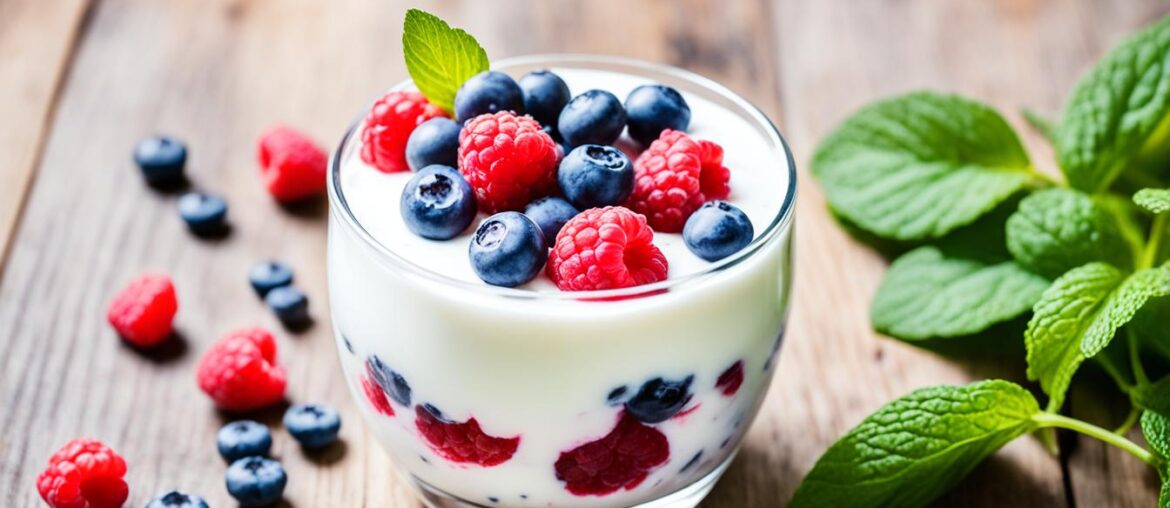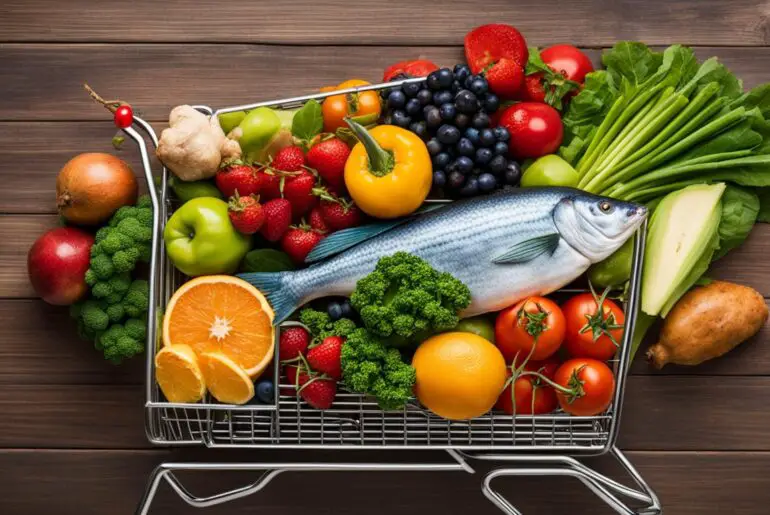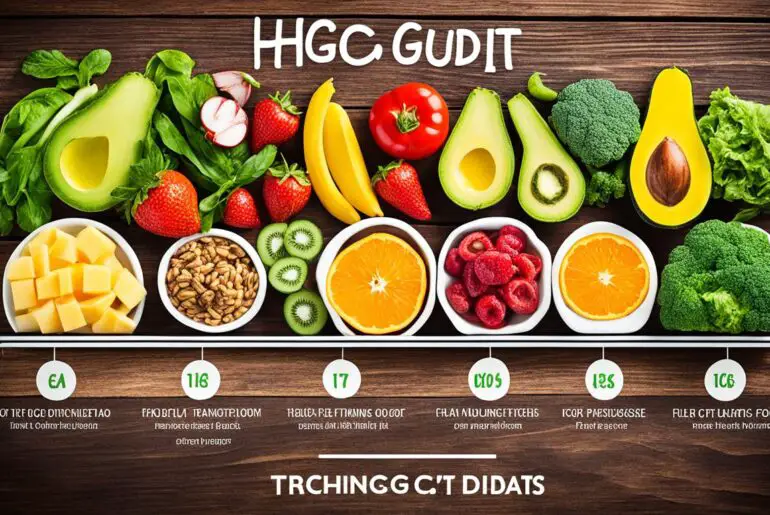Did you know that the HCG diet is a popular weight loss method that restricts calorie intake to just 500-800 calories per day? This surprising statistic highlights the extreme nature of the HCG diet and the challenges it poses in terms of meal planning and finding appropriate food options. One crucial aspect of the HCG diet is understanding which dairy products are allowed, as dairy can be a valuable source of important nutrients.
Key Takeaways:
- The HCG diet restricts calorie intake to 500-800 calories per day.
- Understanding the dairy products allowed on the HCG diet is essential for meal planning.
- Permissible dairy options on the HCG diet include 1 tablespoon of low-fat milk per day.
- There are non-dairy alternatives like almond milk, coconut milk, and soy milk for those who prefer to avoid dairy.
- Consult with a healthcare professional or registered dietitian to determine the best way to incorporate dairy into your HCG diet plan.
What is the HCG Diet?
The HCG diet is a very low-calorie diet that restricts calorie intake to 500-800 calories per day. It is used in conjunction with supplemental HCG injections to stimulate weight loss. The diet has gained popularity in recent years but has not been supported by scientific evidence or approved by the FDA for weight loss purposes.
The HCG diet follows a strict regimen of calorie restriction and daily HCG injections. The theory behind this diet is that the HCG hormone helps curb hunger and promotes the body’s utilization of stored fat for energy. However, it is important to note that there is limited scientific evidence to support these claims, and the FDA has not approved HCG for weight loss.
Despite the lack of scientific backing, many individuals have reported successful weight loss while following the HCG diet. The strict calorie restriction can lead to rapid weight loss in the short term, but it may not be sustainable in the long run. It is crucial to approach this diet with caution and consult with a healthcare professional before embarking on any extreme weight loss program.
HCG Diet Allowed Dairy Products
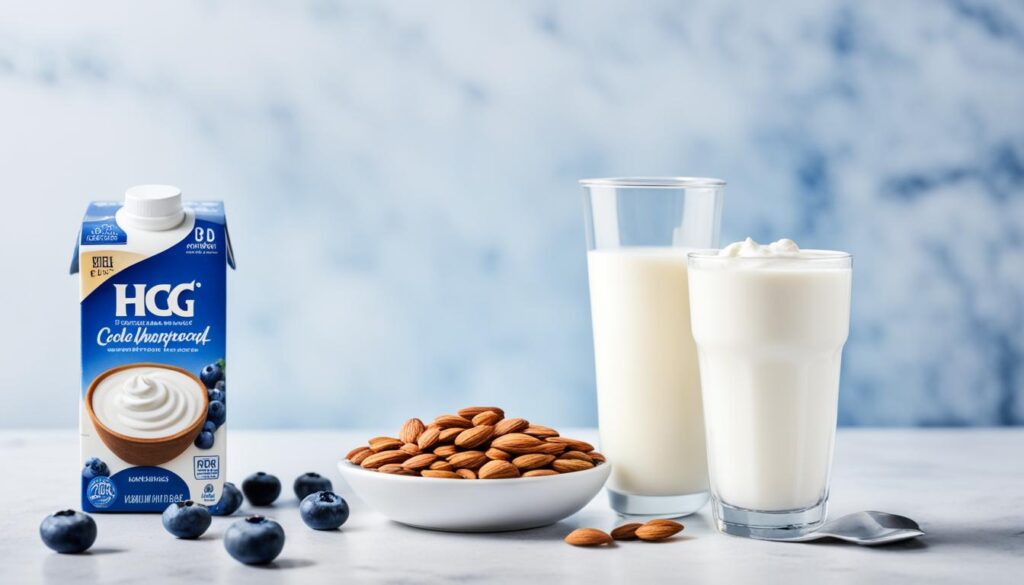
While following the HCG diet, it is crucial to be mindful of the allowed dairy products to maintain a balanced and nutritious meal plan. Although the diet restricts calorie intake, there are still permissible dairy options that can be incorporated into your daily routine.
According to experts, the HCG diet allows for the consumption of 1 tablespoon of milk per day. However, it is important to choose low-fat milk and measure it carefully to ensure it fits within the calorie limits of the diet. This small amount of milk can still provide a hint of creaminess to your beverages or meals while staying compliant with the HCG diet guidelines.
For individuals who enjoy the taste and texture of dairy but want to avoid cow’s milk, there are alternative options available. Consider incorporating almond milk, coconut milk, or soy milk into your HCG diet plan. These non-dairy alternatives can offer similar flavors and benefits without compromising the calorie restrictions of the diet.
“Choosing the right dairy products on the HCG diet is essential to maintaining a healthy and satisfying meal plan. While milk in moderation is allowed, it’s crucial to opt for low-fat options and measure it accurately to stay within the calorie limits.”
By including permissible dairy products in moderation, you can still enjoy the benefits of essential nutrients like calcium and protein while adhering to the guidelines of the HCG diet. However, it is always recommended to consult with a healthcare professional or registered dietitian to create a personalized diet plan that aligns with your specific needs and goals.
Next, we will explore alternatives to dairy on the HCG diet and discuss their benefits and potential downsides. Stay tuned to discover more options that can help you create a diverse and satisfying meal plan while on the HCG diet.
Dairy Alternatives for the HCG Diet
If you prefer to avoid dairy altogether on the HCG diet, there are alternatives that you can consider. Some dairy substitutes that are allowed on the HCG diet include almond milk, coconut milk, and soy milk. These non-dairy options can provide a similar taste and texture to traditional dairy products without compromising the calorie restrictions of the diet.
Benefits of Dairy Alternatives
Switching to dairy alternatives can offer various benefits during your HCG diet. Here are a few reasons why these non-dairy options can be a valuable addition to your meal plan:
- Calorie Control: Dairy alternatives such as almond milk, coconut milk, and soy milk often have fewer calories compared to their dairy counterparts, helping you stay within the calorie limits of the HCG diet.
- Reduced Fat Content: Non-dairy alternatives are typically lower in fat, making them a healthier choice for individuals looking to manage their fat intake while on the HCG diet.
- Dietary Restrictions: If you have lactose intolerance or a dairy allergy, dairy alternatives provide a safe and suitable option to consume nutrient-rich beverages without experiencing any adverse reactions.
Using Dairy Alternatives in HCG Diet Recipes
When incorporating dairy alternatives into your HCG diet recipes, it’s essential to pay attention to the serving sizes and calorie content. Here are a few tips to help you incorporate these substitutes into your meals:
- Check Labels: Look for unsweetened varieties of almond milk, coconut milk, and soy milk to ensure minimal added sugars and fewer calories.
- Consider Nutritional Profile: Non-dairy alternatives may have different nutrient profiles compared to dairy products. Take note of the protein, calcium, and other essential nutrients to ensure your meal plan remains well-balanced.
- Experiment with Flavors: Explore different flavors of dairy alternatives, such as vanilla or chocolate, to add variety and enhance the taste of your HCG diet-friendly recipes.
Remember, while dairy alternatives can offer a suitable option for individuals seeking to avoid dairy on the HCG diet, it’s crucial to consult with a healthcare professional or registered dietitian before making any significant dietary changes to ensure optimal nutrition and personalized guidance.
Importance of Dairy on the HCG Diet
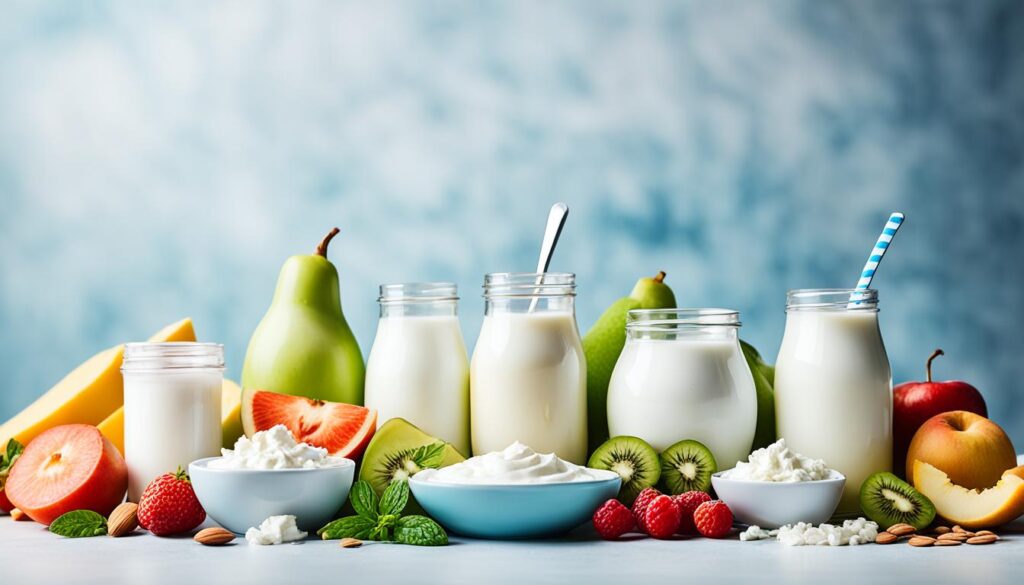
Dairy products play a crucial role in providing essential nutrients on the HCG diet. Despite the restriction on calorie intake, incorporating permissible dairy options in moderation can ensure that your body receives important calcium and protein.
Calcium is essential for maintaining strong bones and teeth, while protein is necessary for muscle repair and growth. By including dairy products in your HCG diet plan, you can help support these vital functions.
It is recommended to consult with a healthcare professional or registered dietitian to determine the best way to include dairy in your HCG diet. They can provide personalized guidance based on your specific needs and goals.
Remember to choose HCG diet-friendly dairy products that fit within the allowed calorie limits. Opt for low-fat or non-fat options to keep your calorie intake in check while still benefiting from the nutrients that dairy provides.
The Benefits of Calcium
Calcium is not only important for bone health but also plays a role in other bodily functions. It helps regulate muscle contractions, supports nerve function, and promotes normal blood clotting. Including dairy in your HCG diet can help ensure you’re meeting your daily calcium needs.
“Calcium is crucial for maintaining strong bones and teeth, and it also plays a role in supporting other important bodily functions.” – Dr. Jane Thompson, Registered Dietitian
The Importance of Protein
Protein is an essential macronutrient that your body needs for various functions. It helps build and repair tissues, supports immune function, and contributes to the production of enzymes and hormones. Including dairy in your HCG diet can provide a source of high-quality protein.
“Protein is a key nutrient for muscle repair and growth. By including dairy products on the HCG diet, you can ensure you’re getting enough protein to support your body’s needs.” – Joanna Davis, Certified Nutritionist
When incorporating dairy into your HCG diet plan, be mindful of portion sizes and choose low-fat or non-fat options whenever possible. This will help you stay within the calorie limits of the diet while maximizing the nutritional benefits of dairy.
| Dairy Product | Calories (per serving) | Calcium Content (per serving) | Protein Content (per serving) |
|---|---|---|---|
| Skim Milk | 83 | 303 mg | 8.4 g |
| Plain Greek Yogurt | 59 | 183 mg | 10 g |
| Low-Fat Cottage Cheese | 102 | 92 mg | 14 g |
By including dairy products like skim milk, plain Greek yogurt, and low-fat cottage cheese in your HCG diet, you can enjoy the nutritional benefits without compromising your weight loss goals.
Remember, moderation is key when it comes to incorporating dairy into the HCG diet. Work with a healthcare professional or registered dietitian to find the right balance of dairy products that align with your unique dietary needs and preferences.
Benefits and Risks of Including Dairy on the HCG Diet
When following the HCG diet, incorporating dairy products can offer several benefits. Firstly, dairy is a good source of essential nutrients such as calcium and protein, which are important for overall health and well-being. Adding dairy to your meal plan can help ensure you’re getting these vital nutrients even on a restricted-calorie diet.
Furthermore, including dairy options can provide variety and enhance the taste of your meals. From a creamy Greek yogurt parfait to a satisfying cheese omelette, dairy products can add richness and indulgence to your HCG diet-friendly recipes.
However, it is crucial to consider the potential risks associated with including dairy on the HCG diet. Some experts are concerned about nutrient deficiencies that may arise from consuming limited amounts of dairy and adhering to an already restrictive eating plan.
“While dairy can provide essential nutrients, it’s important to be cautious and ensure you’re not compromising the nutritional balance of your diet,” says Dr. Emily Thompson, a registered dietitian.
It is advisable to consult with a healthcare professional or registered dietitian before making any major dietary changes, especially if you have specific dietary requirements or concerns. They can provide personalized guidance and help you determine the best approach for incorporating dairy and other foods into your HCG diet plan while still maintaining the desired weight loss goals.
Expert Tip:
“If you decide to include dairy in your HCG diet, opt for low-fat options and carefully measure quantities to ensure they fit within your calorie limits,” advises Dr. Thompson.
Remember, everyone’s body is unique, and what works for one person may not work for another. By seeking professional advice, you can make informed decisions and create a dietary plan that suits your individual needs, preferences, and health goals.
HCG Diet and Dairy Allergies
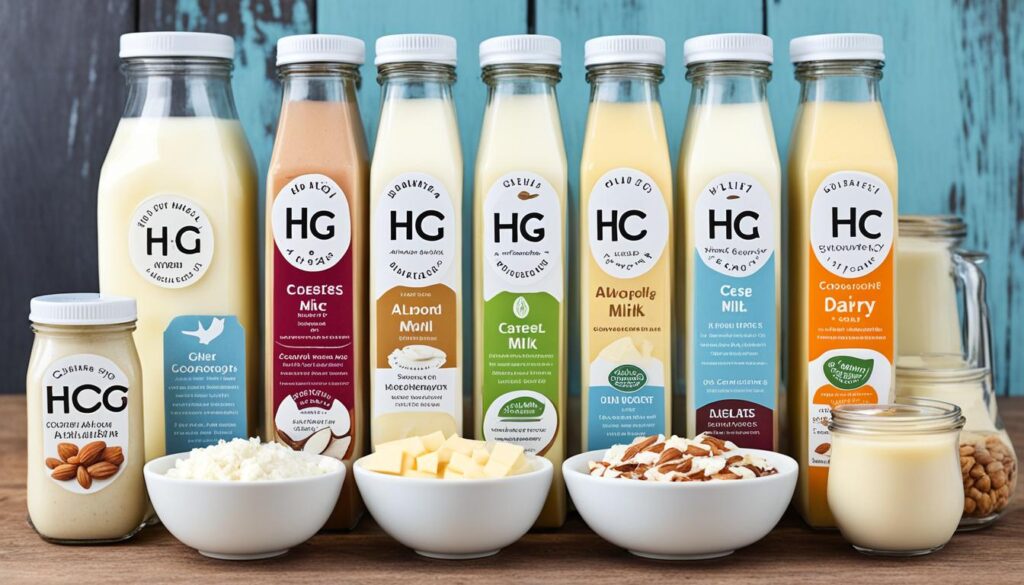
If you have a dairy allergy or lactose intolerance, finding suitable alternatives that are allowed on the HCG diet is crucial. Fortunately, there are a variety of non-dairy options available in the market that can be used as substitutes for dairy products. These alternatives provide a way to enjoy the benefits of dairy without the potential adverse reactions. It is important to read labels carefully and choose products that are specifically labeled as dairy-free or lactose-free.
Soy milk, almond milk, and coconut milk are popular dairy alternatives that can be incorporated into the HCG diet. These dairy-free options are typically rich in nutrients and can provide a similar taste and texture to traditional dairy products. However, it is important to note that not all dairy substitutes are created equal. Some may contain added sugars or preservatives, so it is essential to choose products with minimal ingredients and no added sugars.
When selecting dairy alternatives, look for options that are fortified with calcium and vitamin D to ensure you are still getting these essential nutrients. Additionally, consulting with a healthcare professional or registered dietitian can provide personalized guidance and recommendations based on your specific dietary needs and preferences.
Incorporating dairy alternatives into your HCG diet can allow you to enjoy a wide variety of flavorful options without compromising your dietary restrictions. Whether you prefer soy milk in your coffee or almond milk in your smoothie, there are plenty of delicious and HCG-friendly dairy alternatives to choose from.
| Dairy Alternatives | Nutritional Benefits |
|---|---|
| Soy Milk | Rich source of protein and calcium, fortified with essential nutrients |
| Almond Milk | Naturally low in calories, contains vitamin E and healthy fats |
| Coconut Milk | Provides medium-chain triglycerides for sustained energy, creamy texture |
With these dairy alternatives, you can still enjoy creamy soups, smoothies, or even a splash of milk in your tea or coffee while following the HCG diet. Remember to choose options that are unsweetened and free of any additives or unnecessary ingredients.
Expert Opinions on HCG Diet and Dairy
When it comes to the HCG diet and its allowance of dairy products, there are varying opinions among registered dietitians and nutrition experts. While some express concerns about the diet’s low-calorie nature and potential for nutrient deficiencies, others believe that incorporating dairy in moderation can provide essential nutrients. It is important to note that individual needs and preferences may differ, so it is recommended to seek personalized advice from a healthcare professional to determine the best approach for your specific situation.
On one side of the spectrum, some experts caution against the HCG diet’s low-calorie intake and its impact on nutrient balance. The restricted calorie limits of the diet can make it challenging to consume enough essential nutrients, including those typically found in dairy products. These experts advise caution when considering the inclusion of dairy and recommend monitoring nutrient levels closely to ensure adequate intake.
On the other hand, there are experts who believe that including dairy in moderation can offer important nutritional benefits. Dairy products are a good source of calcium, protein, and other essential nutrients. Incorporating permissible dairy options on the HCG diet can help meet nutritional needs, provide variety in meal planning, and contribute to a more satisfying and sustainable diet.
“While the HCG diet restricts calorie intake, incorporating dairy in moderation can help address nutrient deficiencies and provide essential nutrients for overall well-being. However, it’s essential to consider individual dietary needs and consult with a healthcare professional to ensure the diet is safe and appropriate for you.”
Expert Tip: Personalized Advice is Key
Given the differing opinions and considerations surrounding the HCG diet’s allowance of dairy products, it is crucial to seek personalized advice. Every individual is unique, and what may work for one person may not work for another. A registered dietitian or healthcare professional can assess your specific needs, preferences, and health conditions to provide tailored guidance and support.
| Expert Opinion | Summary |
|---|---|
| Concerns about low-calorie intake and nutrient deficiencies | – Restricted calorie limits of the HCG diet can make it challenging to consume enough essential nutrients. |
| Benefits of including dairy in moderation | – Dairy products are a good source of calcium, protein, and other essential nutrients. – Permissible dairy options can help meet nutritional needs and add variety to meal planning. |
Conclusion
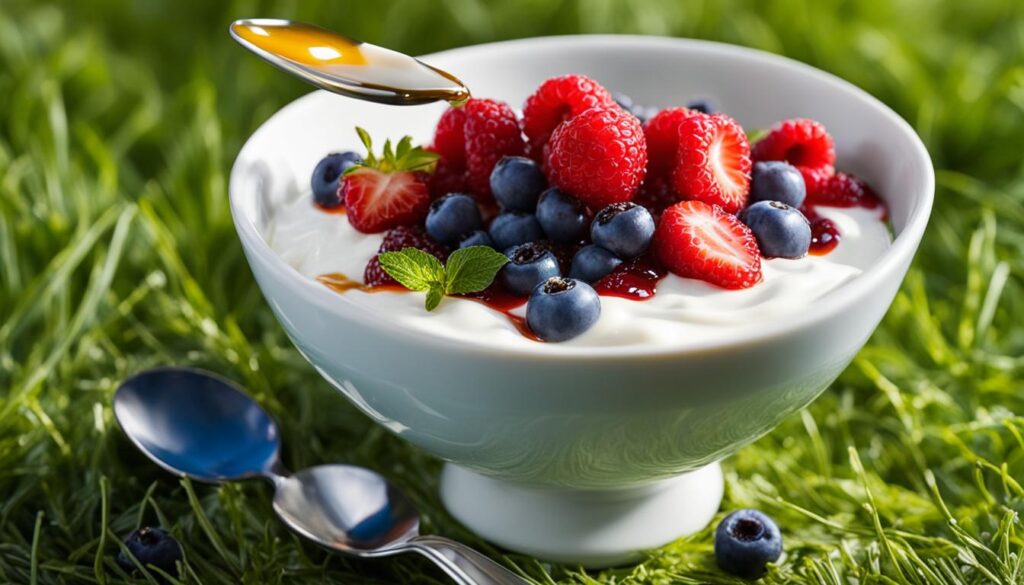
The HCG diet is a controversial weight loss method that restricts calorie intake and includes supplemental HCG injections. While there are some dairy products allowed on the HCG diet, it is important to consider the potential risks and benefits and to consult with a healthcare professional before making any dietary changes. Incorporating permissible dairy options in moderation can provide essential nutrients, but it is crucial to ensure they fit within the calorie limits of the diet.
In conclusion, the HCG diet allows for certain dairy products to be consumed, such as 1 tablespoon of low-fat milk per day. However, it is advised to explore dairy alternatives like almond milk, coconut milk, and soy milk for those who prefer to avoid dairy altogether. Dairy products can be a source of important nutrients but should be consumed in moderation to comply with the calorie restrictions of the diet. It is always best to seek personalized advice from a healthcare professional or registered dietitian to ensure that your dietary choices align with your specific needs and goals.
How to Lose Weight When You Don’t Know Where to Start, According to a Dietitian
If you’re struggling to lose weight and don’t know where to begin, it’s time to seek guidance from a registered dietitian or healthcare professional. They have the knowledge and expertise to help you create an effective and sustainable weight loss plan tailored to your specific needs and preferences.
A dietitian can assess your current eating habits, exercise routine, and overall health to provide personalized recommendations. They will take into consideration your unique goals, lifestyle, and any dietary restrictions you may have. With their guidance, you can develop a plan that is realistic, achievable, and safe.
Whether you’re considering the HCG Diet or other weight loss approaches, a dietitian can offer invaluable support. They can help you navigate through various diets, understand their pros and cons, and make informed decisions about the best approach for you.
Remember, losing weight is not just about following a restrictive diet or taking certain supplements. It’s a journey that requires a holistic approach, including healthy eating, regular physical activity, and lifestyle changes. With the guidance of a dietitian, you can embark on this journey with confidence, knowing that you have a knowledgeable professional by your side.
FAQ
What is the HCG Diet?
The HCG diet is a low-calorie diet that is used in conjunction with HCG injections to promote weight loss. While the effectiveness and safety of the HCG diet have been a subject of debate, it is important to understand which dairy products are allowed on this diet to ensure a healthier and tastier meal plan.
What dairy products are allowed on the HCG Diet?
According to experts, permissible dairy options on the HCG diet include 1 tablespoon of low-fat milk per day. It is important to note that the milk should be carefully measured to stay within the calorie limits of the diet.
Are there any dairy alternatives for the HCG diet?
Yes, if you prefer to avoid dairy altogether on the HCG diet, there are alternatives that you can consider. Some dairy substitutes that are allowed on the HCG diet include almond milk, coconut milk, and soy milk. These non-dairy options can provide a similar taste and texture to traditional dairy products without compromising the calorie restrictions of the diet.
Why is dairy important on the HCG diet?
Dairy products can be a good source of essential nutrients, such as calcium and protein. While the HCG diet restricts calorie intake, incorporating permissible dairy options in moderation can help ensure you are getting these important nutrients.
What are the benefits and risks of including dairy on the HCG diet?
Including dairy on the HCG diet can have its benefits, such as providing essential nutrients and adding variety to your meal plan. However, it is important to consider the potential risks as well. Some experts express concerns about nutrient deficiencies and the restrictive nature of the diet.
Can I include dairy on the HCG diet if I have a dairy allergy or lactose intolerance?
If you have a dairy allergy or lactose intolerance, it is essential to find suitable alternatives that are allowed on the HCG diet. There are a variety of non-dairy options available in the market that can be used as substitutes for dairy products. It is crucial to read labels carefully and consult with a healthcare professional if you have any concerns.
What do experts say about the HCG diet and dairy?
Registered dietitians and nutrition experts have different opinions about the HCG diet and its allowance of dairy products. Some express concerns about the diet’s low-calorie nature and potential for nutrient deficiencies, while others believe that incorporating dairy in moderation can provide essential nutrients. It is recommended to seek personalized advice from a healthcare professional.
Are dairy products approved on the HCG diet?
The HCG diet is a controversial weight loss method that restricts calorie intake and includes supplemental HCG injections. While there are some dairy products allowed on the HCG diet, it is important to consider the potential risks and benefits and to consult with a healthcare professional before making any dietary changes. Incorporating permissible dairy options in moderation can provide essential nutrients, but it is crucial to ensure they fit within the calorie limits of the diet.
How can I lose weight when I don’t know where to start?
If you are looking for effective and sustainable ways to lose weight, it is recommended to consult with a registered dietitian or healthcare professional. They can provide personalized guidance and create a customized weight loss plan that suits your individual needs and preferences.

